Data Privacy in Australia: An Analysis of Roles and Responsibilities
VerifiedAdded on 2023/01/20
|9
|2158
|60
Essay
AI Summary
This essay provides a comprehensive analysis of data privacy in Australia, examining the roles and responsibilities of the government, businesses, and individuals in maintaining data protection. The introduction highlights the crucial importance of data privacy in the digital age, emphasizing the potential consequences of its absence. The essay then delves into the distinct roles and responsibilities of each entity: the Australian government's role in establishing and enforcing data protection laws, including the Australian Privacy Principles (APPs); businesses' responsibility to implement data security measures and train employees; and individuals' role in safeguarding their personal information and being aware of privacy terms. The essay concludes by emphasizing the interconnectedness of these roles and the need for continuous updates and vigilance from all parties to create a safe environment for data protection. The essay also references relevant literature to support its arguments.
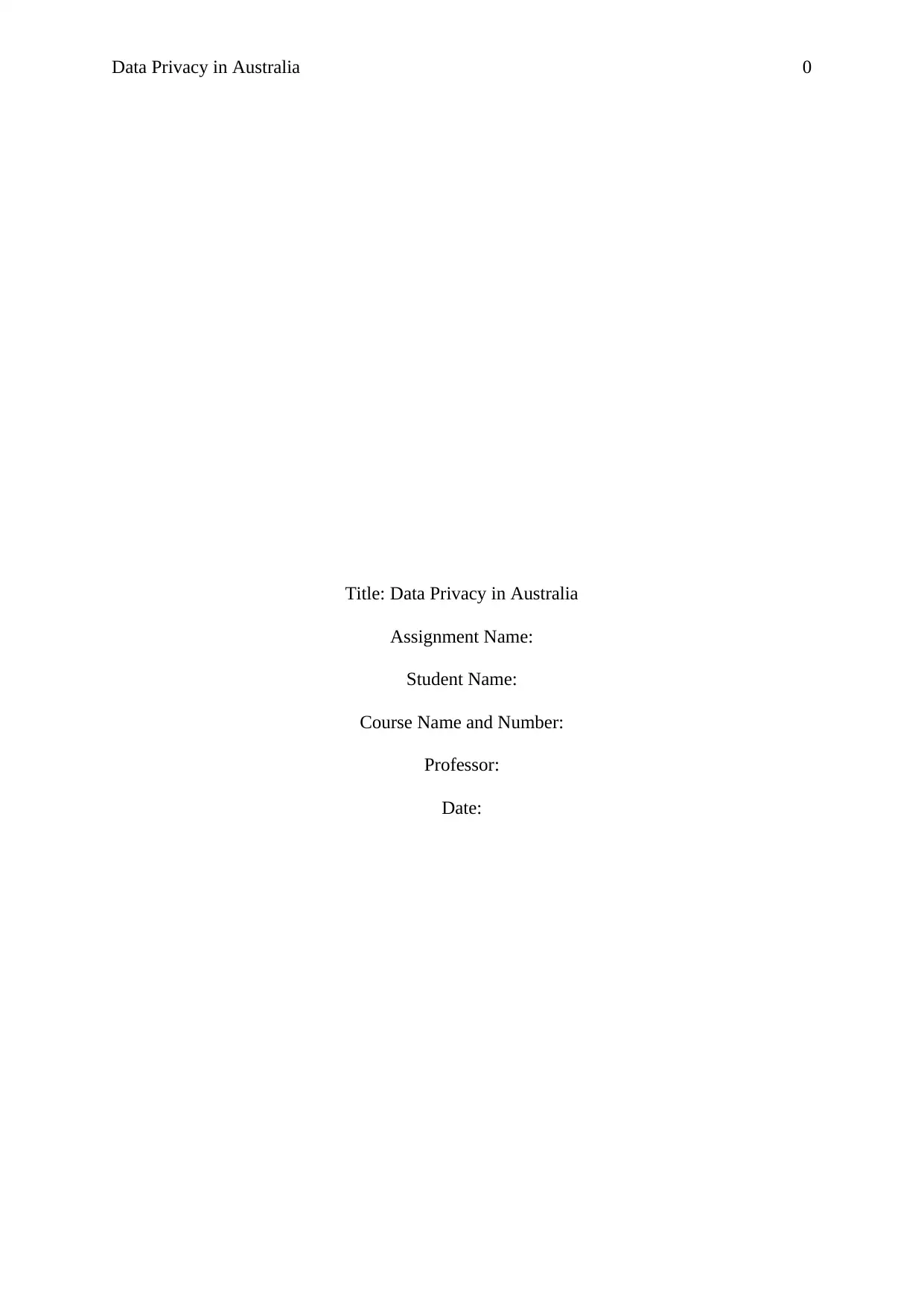
Data Privacy in Australia 0
Title: Data Privacy in Australia
Assignment Name:
Student Name:
Course Name and Number:
Professor:
Date:
Title: Data Privacy in Australia
Assignment Name:
Student Name:
Course Name and Number:
Professor:
Date:
Paraphrase This Document
Need a fresh take? Get an instant paraphrase of this document with our AI Paraphraser
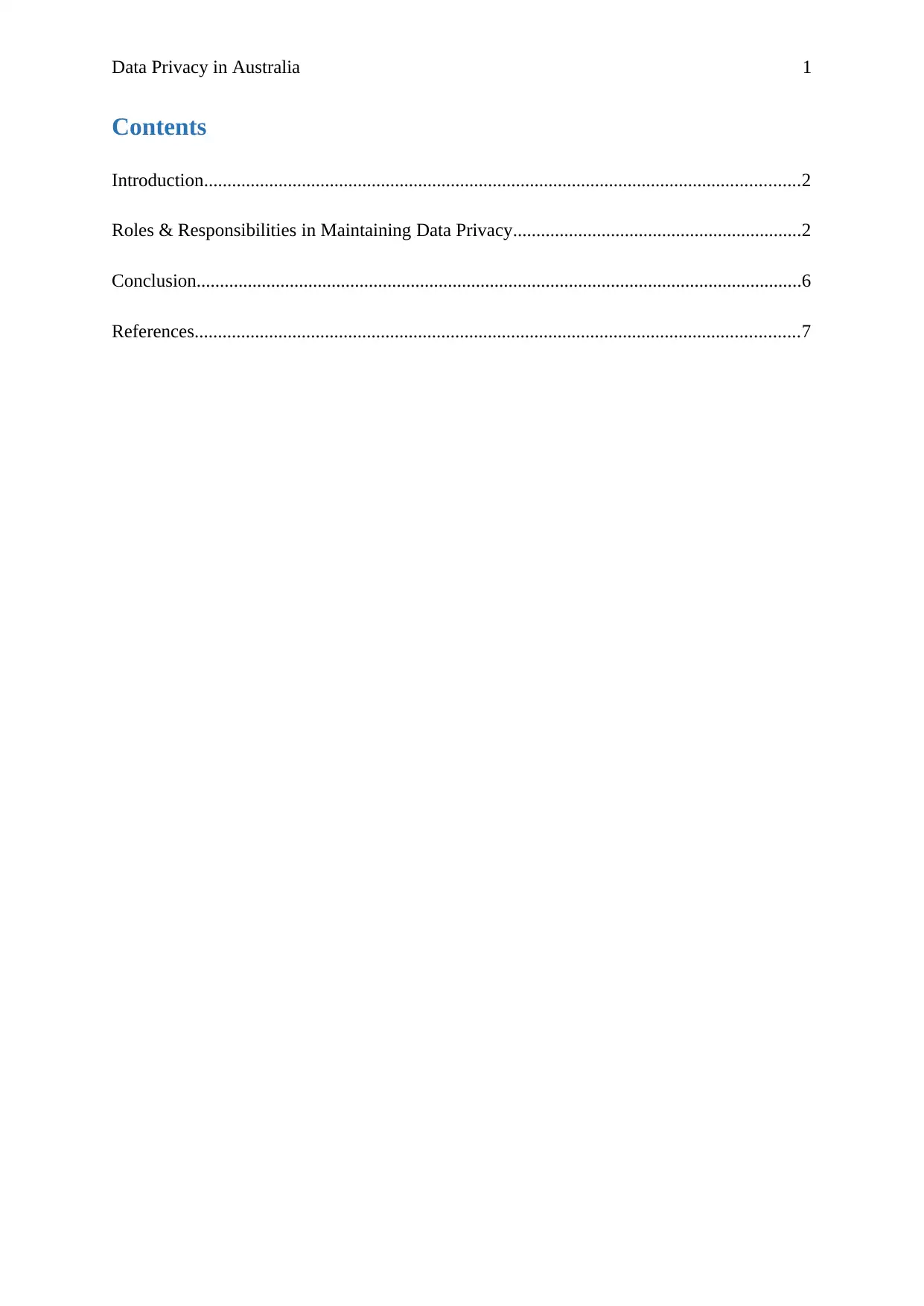
Data Privacy in Australia 1
Contents
Introduction................................................................................................................................2
Roles & Responsibilities in Maintaining Data Privacy..............................................................2
Conclusion..................................................................................................................................6
References..................................................................................................................................7
Contents
Introduction................................................................................................................................2
Roles & Responsibilities in Maintaining Data Privacy..............................................................2
Conclusion..................................................................................................................................6
References..................................................................................................................................7
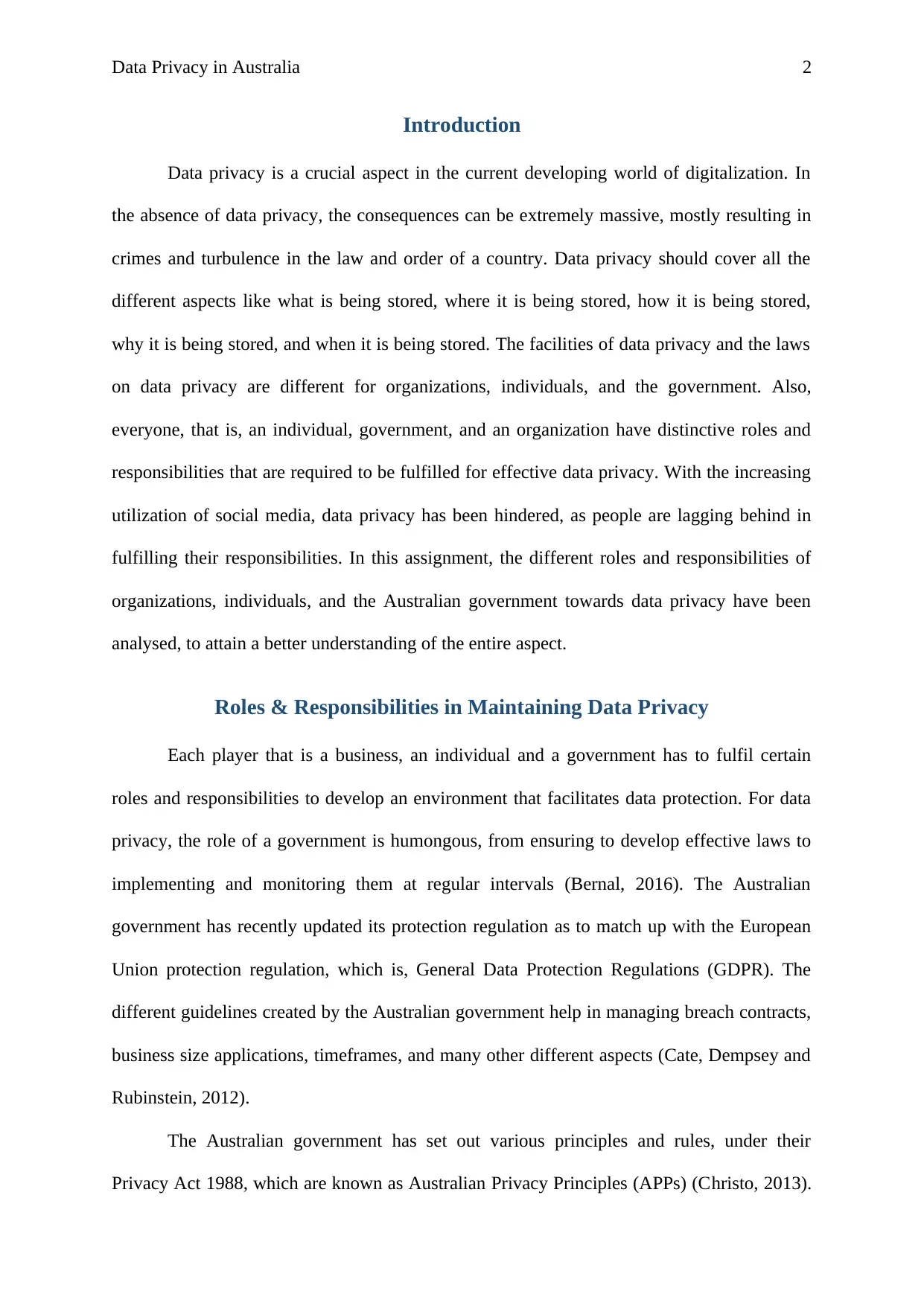
Data Privacy in Australia 2
Introduction
Data privacy is a crucial aspect in the current developing world of digitalization. In
the absence of data privacy, the consequences can be extremely massive, mostly resulting in
crimes and turbulence in the law and order of a country. Data privacy should cover all the
different aspects like what is being stored, where it is being stored, how it is being stored,
why it is being stored, and when it is being stored. The facilities of data privacy and the laws
on data privacy are different for organizations, individuals, and the government. Also,
everyone, that is, an individual, government, and an organization have distinctive roles and
responsibilities that are required to be fulfilled for effective data privacy. With the increasing
utilization of social media, data privacy has been hindered, as people are lagging behind in
fulfilling their responsibilities. In this assignment, the different roles and responsibilities of
organizations, individuals, and the Australian government towards data privacy have been
analysed, to attain a better understanding of the entire aspect.
Roles & Responsibilities in Maintaining Data Privacy
Each player that is a business, an individual and a government has to fulfil certain
roles and responsibilities to develop an environment that facilitates data protection. For data
privacy, the role of a government is humongous, from ensuring to develop effective laws to
implementing and monitoring them at regular intervals (Bernal, 2016). The Australian
government has recently updated its protection regulation as to match up with the European
Union protection regulation, which is, General Data Protection Regulations (GDPR). The
different guidelines created by the Australian government help in managing breach contracts,
business size applications, timeframes, and many other different aspects (Cate, Dempsey and
Rubinstein, 2012).
The Australian government has set out various principles and rules, under their
Privacy Act 1988, which are known as Australian Privacy Principles (APPs) (Christo, 2013).
Introduction
Data privacy is a crucial aspect in the current developing world of digitalization. In
the absence of data privacy, the consequences can be extremely massive, mostly resulting in
crimes and turbulence in the law and order of a country. Data privacy should cover all the
different aspects like what is being stored, where it is being stored, how it is being stored,
why it is being stored, and when it is being stored. The facilities of data privacy and the laws
on data privacy are different for organizations, individuals, and the government. Also,
everyone, that is, an individual, government, and an organization have distinctive roles and
responsibilities that are required to be fulfilled for effective data privacy. With the increasing
utilization of social media, data privacy has been hindered, as people are lagging behind in
fulfilling their responsibilities. In this assignment, the different roles and responsibilities of
organizations, individuals, and the Australian government towards data privacy have been
analysed, to attain a better understanding of the entire aspect.
Roles & Responsibilities in Maintaining Data Privacy
Each player that is a business, an individual and a government has to fulfil certain
roles and responsibilities to develop an environment that facilitates data protection. For data
privacy, the role of a government is humongous, from ensuring to develop effective laws to
implementing and monitoring them at regular intervals (Bernal, 2016). The Australian
government has recently updated its protection regulation as to match up with the European
Union protection regulation, which is, General Data Protection Regulations (GDPR). The
different guidelines created by the Australian government help in managing breach contracts,
business size applications, timeframes, and many other different aspects (Cate, Dempsey and
Rubinstein, 2012).
The Australian government has set out various principles and rules, under their
Privacy Act 1988, which are known as Australian Privacy Principles (APPs) (Christo, 2013).
⊘ This is a preview!⊘
Do you want full access?
Subscribe today to unlock all pages.

Trusted by 1+ million students worldwide
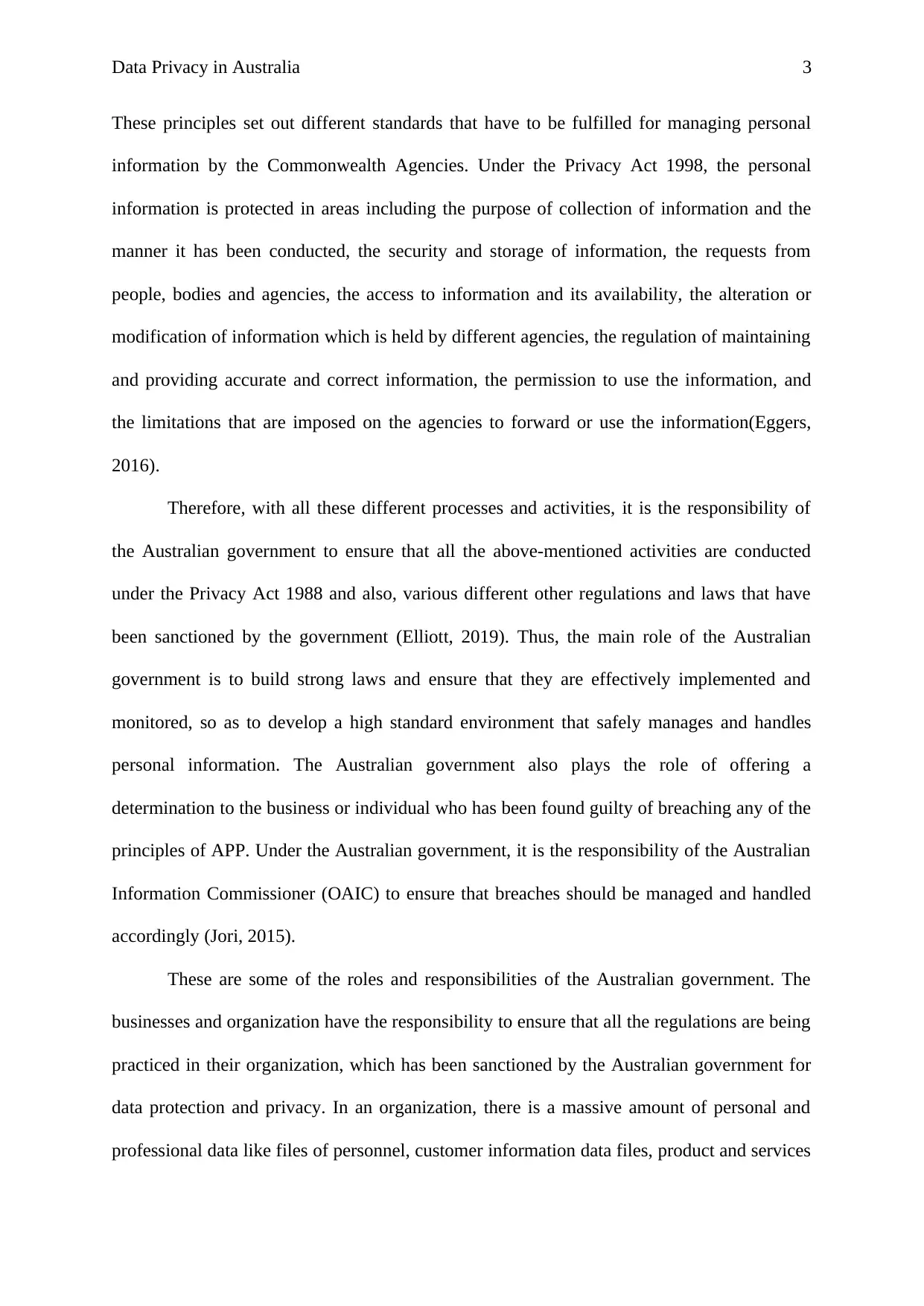
Data Privacy in Australia 3
These principles set out different standards that have to be fulfilled for managing personal
information by the Commonwealth Agencies. Under the Privacy Act 1998, the personal
information is protected in areas including the purpose of collection of information and the
manner it has been conducted, the security and storage of information, the requests from
people, bodies and agencies, the access to information and its availability, the alteration or
modification of information which is held by different agencies, the regulation of maintaining
and providing accurate and correct information, the permission to use the information, and
the limitations that are imposed on the agencies to forward or use the information(Eggers,
2016).
Therefore, with all these different processes and activities, it is the responsibility of
the Australian government to ensure that all the above-mentioned activities are conducted
under the Privacy Act 1988 and also, various different other regulations and laws that have
been sanctioned by the government (Elliott, 2019). Thus, the main role of the Australian
government is to build strong laws and ensure that they are effectively implemented and
monitored, so as to develop a high standard environment that safely manages and handles
personal information. The Australian government also plays the role of offering a
determination to the business or individual who has been found guilty of breaching any of the
principles of APP. Under the Australian government, it is the responsibility of the Australian
Information Commissioner (OAIC) to ensure that breaches should be managed and handled
accordingly (Jori, 2015).
These are some of the roles and responsibilities of the Australian government. The
businesses and organization have the responsibility to ensure that all the regulations are being
practiced in their organization, which has been sanctioned by the Australian government for
data protection and privacy. In an organization, there is a massive amount of personal and
professional data like files of personnel, customer information data files, product and services
These principles set out different standards that have to be fulfilled for managing personal
information by the Commonwealth Agencies. Under the Privacy Act 1998, the personal
information is protected in areas including the purpose of collection of information and the
manner it has been conducted, the security and storage of information, the requests from
people, bodies and agencies, the access to information and its availability, the alteration or
modification of information which is held by different agencies, the regulation of maintaining
and providing accurate and correct information, the permission to use the information, and
the limitations that are imposed on the agencies to forward or use the information(Eggers,
2016).
Therefore, with all these different processes and activities, it is the responsibility of
the Australian government to ensure that all the above-mentioned activities are conducted
under the Privacy Act 1988 and also, various different other regulations and laws that have
been sanctioned by the government (Elliott, 2019). Thus, the main role of the Australian
government is to build strong laws and ensure that they are effectively implemented and
monitored, so as to develop a high standard environment that safely manages and handles
personal information. The Australian government also plays the role of offering a
determination to the business or individual who has been found guilty of breaching any of the
principles of APP. Under the Australian government, it is the responsibility of the Australian
Information Commissioner (OAIC) to ensure that breaches should be managed and handled
accordingly (Jori, 2015).
These are some of the roles and responsibilities of the Australian government. The
businesses and organization have the responsibility to ensure that all the regulations are being
practiced in their organization, which has been sanctioned by the Australian government for
data protection and privacy. In an organization, there is a massive amount of personal and
professional data like files of personnel, customer information data files, product and services
Paraphrase This Document
Need a fresh take? Get an instant paraphrase of this document with our AI Paraphraser
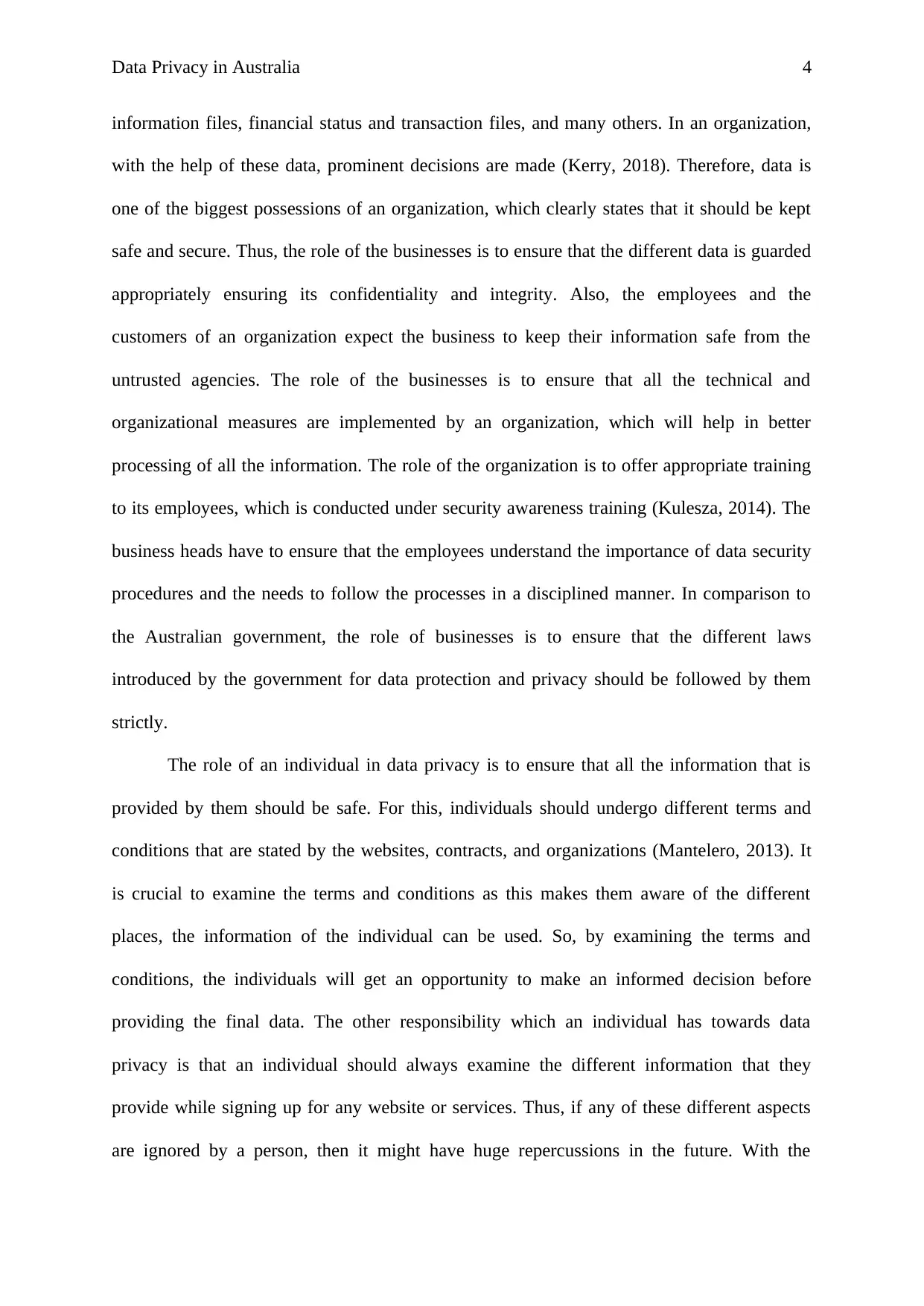
Data Privacy in Australia 4
information files, financial status and transaction files, and many others. In an organization,
with the help of these data, prominent decisions are made (Kerry, 2018). Therefore, data is
one of the biggest possessions of an organization, which clearly states that it should be kept
safe and secure. Thus, the role of the businesses is to ensure that the different data is guarded
appropriately ensuring its confidentiality and integrity. Also, the employees and the
customers of an organization expect the business to keep their information safe from the
untrusted agencies. The role of the businesses is to ensure that all the technical and
organizational measures are implemented by an organization, which will help in better
processing of all the information. The role of the organization is to offer appropriate training
to its employees, which is conducted under security awareness training (Kulesza, 2014). The
business heads have to ensure that the employees understand the importance of data security
procedures and the needs to follow the processes in a disciplined manner. In comparison to
the Australian government, the role of businesses is to ensure that the different laws
introduced by the government for data protection and privacy should be followed by them
strictly.
The role of an individual in data privacy is to ensure that all the information that is
provided by them should be safe. For this, individuals should undergo different terms and
conditions that are stated by the websites, contracts, and organizations (Mantelero, 2013). It
is crucial to examine the terms and conditions as this makes them aware of the different
places, the information of the individual can be used. So, by examining the terms and
conditions, the individuals will get an opportunity to make an informed decision before
providing the final data. The other responsibility which an individual has towards data
privacy is that an individual should always examine the different information that they
provide while signing up for any website or services. Thus, if any of these different aspects
are ignored by a person, then it might have huge repercussions in the future. With the
information files, financial status and transaction files, and many others. In an organization,
with the help of these data, prominent decisions are made (Kerry, 2018). Therefore, data is
one of the biggest possessions of an organization, which clearly states that it should be kept
safe and secure. Thus, the role of the businesses is to ensure that the different data is guarded
appropriately ensuring its confidentiality and integrity. Also, the employees and the
customers of an organization expect the business to keep their information safe from the
untrusted agencies. The role of the businesses is to ensure that all the technical and
organizational measures are implemented by an organization, which will help in better
processing of all the information. The role of the organization is to offer appropriate training
to its employees, which is conducted under security awareness training (Kulesza, 2014). The
business heads have to ensure that the employees understand the importance of data security
procedures and the needs to follow the processes in a disciplined manner. In comparison to
the Australian government, the role of businesses is to ensure that the different laws
introduced by the government for data protection and privacy should be followed by them
strictly.
The role of an individual in data privacy is to ensure that all the information that is
provided by them should be safe. For this, individuals should undergo different terms and
conditions that are stated by the websites, contracts, and organizations (Mantelero, 2013). It
is crucial to examine the terms and conditions as this makes them aware of the different
places, the information of the individual can be used. So, by examining the terms and
conditions, the individuals will get an opportunity to make an informed decision before
providing the final data. The other responsibility which an individual has towards data
privacy is that an individual should always examine the different information that they
provide while signing up for any website or services. Thus, if any of these different aspects
are ignored by a person, then it might have huge repercussions in the future. With the
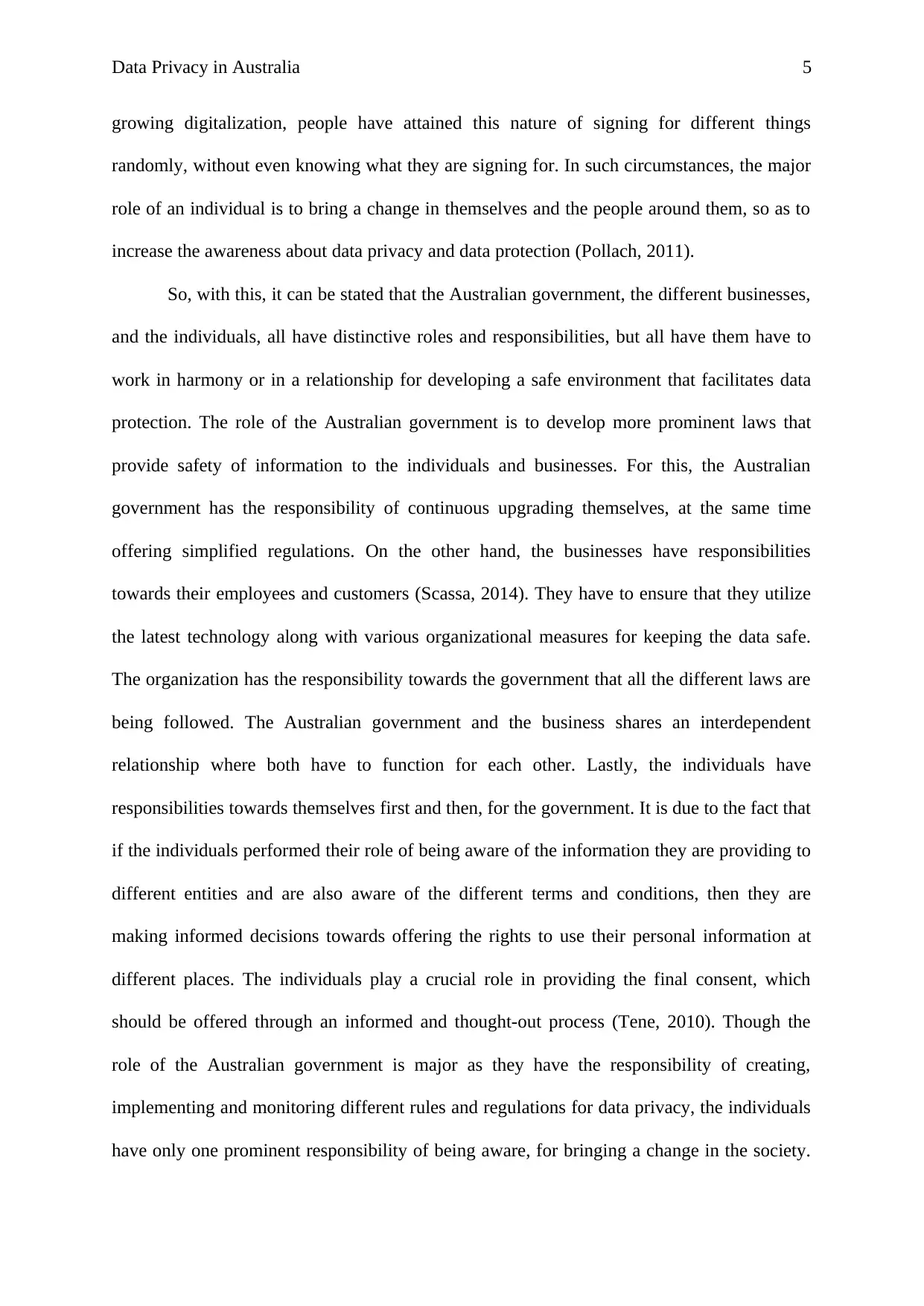
Data Privacy in Australia 5
growing digitalization, people have attained this nature of signing for different things
randomly, without even knowing what they are signing for. In such circumstances, the major
role of an individual is to bring a change in themselves and the people around them, so as to
increase the awareness about data privacy and data protection (Pollach, 2011).
So, with this, it can be stated that the Australian government, the different businesses,
and the individuals, all have distinctive roles and responsibilities, but all have them have to
work in harmony or in a relationship for developing a safe environment that facilitates data
protection. The role of the Australian government is to develop more prominent laws that
provide safety of information to the individuals and businesses. For this, the Australian
government has the responsibility of continuous upgrading themselves, at the same time
offering simplified regulations. On the other hand, the businesses have responsibilities
towards their employees and customers (Scassa, 2014). They have to ensure that they utilize
the latest technology along with various organizational measures for keeping the data safe.
The organization has the responsibility towards the government that all the different laws are
being followed. The Australian government and the business shares an interdependent
relationship where both have to function for each other. Lastly, the individuals have
responsibilities towards themselves first and then, for the government. It is due to the fact that
if the individuals performed their role of being aware of the information they are providing to
different entities and are also aware of the different terms and conditions, then they are
making informed decisions towards offering the rights to use their personal information at
different places. The individuals play a crucial role in providing the final consent, which
should be offered through an informed and thought-out process (Tene, 2010). Though the
role of the Australian government is major as they have the responsibility of creating,
implementing and monitoring different rules and regulations for data privacy, the individuals
have only one prominent responsibility of being aware, for bringing a change in the society.
growing digitalization, people have attained this nature of signing for different things
randomly, without even knowing what they are signing for. In such circumstances, the major
role of an individual is to bring a change in themselves and the people around them, so as to
increase the awareness about data privacy and data protection (Pollach, 2011).
So, with this, it can be stated that the Australian government, the different businesses,
and the individuals, all have distinctive roles and responsibilities, but all have them have to
work in harmony or in a relationship for developing a safe environment that facilitates data
protection. The role of the Australian government is to develop more prominent laws that
provide safety of information to the individuals and businesses. For this, the Australian
government has the responsibility of continuous upgrading themselves, at the same time
offering simplified regulations. On the other hand, the businesses have responsibilities
towards their employees and customers (Scassa, 2014). They have to ensure that they utilize
the latest technology along with various organizational measures for keeping the data safe.
The organization has the responsibility towards the government that all the different laws are
being followed. The Australian government and the business shares an interdependent
relationship where both have to function for each other. Lastly, the individuals have
responsibilities towards themselves first and then, for the government. It is due to the fact that
if the individuals performed their role of being aware of the information they are providing to
different entities and are also aware of the different terms and conditions, then they are
making informed decisions towards offering the rights to use their personal information at
different places. The individuals play a crucial role in providing the final consent, which
should be offered through an informed and thought-out process (Tene, 2010). Though the
role of the Australian government is major as they have the responsibility of creating,
implementing and monitoring different rules and regulations for data privacy, the individuals
have only one prominent responsibility of being aware, for bringing a change in the society.
⊘ This is a preview!⊘
Do you want full access?
Subscribe today to unlock all pages.

Trusted by 1+ million students worldwide
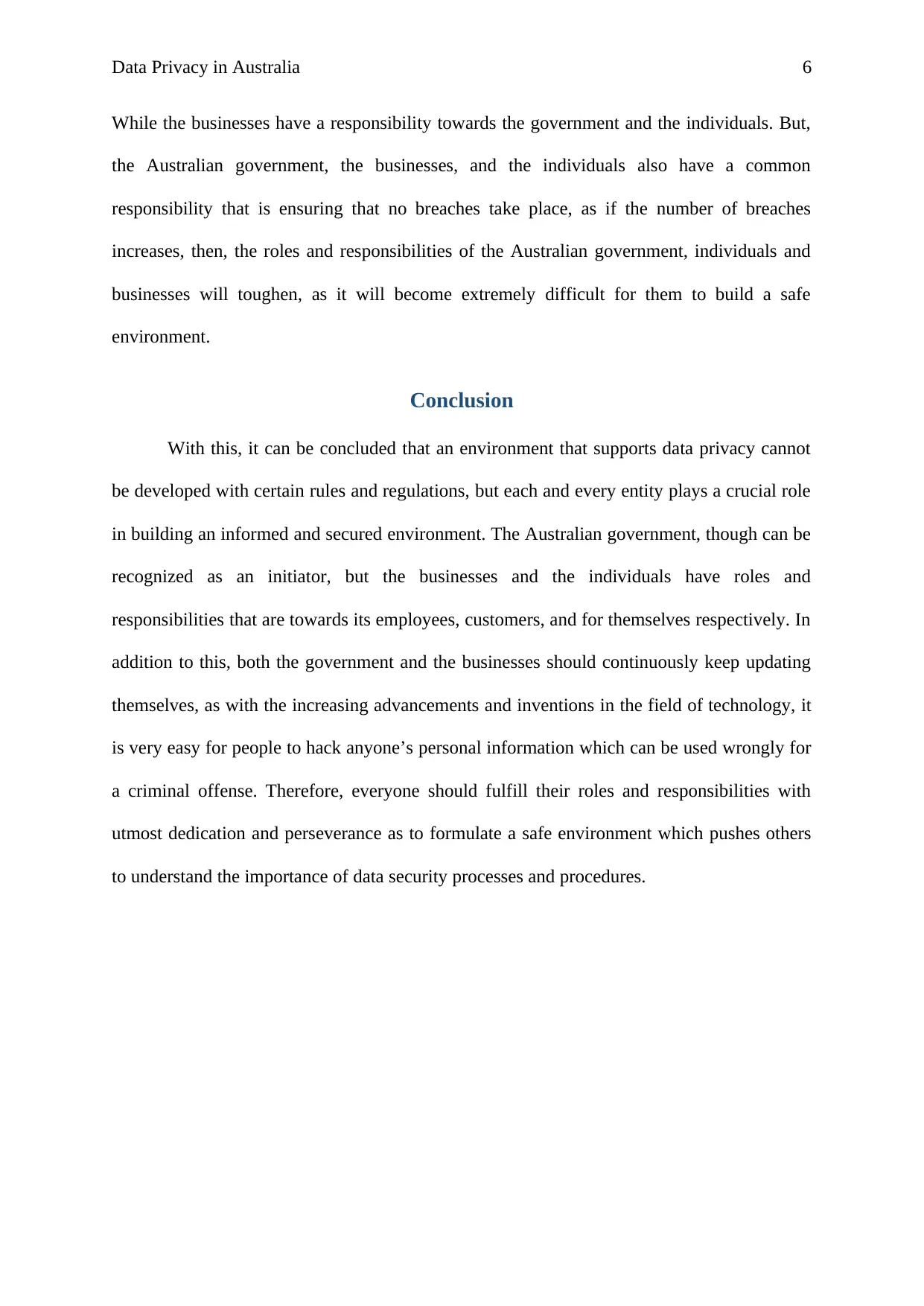
Data Privacy in Australia 6
While the businesses have a responsibility towards the government and the individuals. But,
the Australian government, the businesses, and the individuals also have a common
responsibility that is ensuring that no breaches take place, as if the number of breaches
increases, then, the roles and responsibilities of the Australian government, individuals and
businesses will toughen, as it will become extremely difficult for them to build a safe
environment.
Conclusion
With this, it can be concluded that an environment that supports data privacy cannot
be developed with certain rules and regulations, but each and every entity plays a crucial role
in building an informed and secured environment. The Australian government, though can be
recognized as an initiator, but the businesses and the individuals have roles and
responsibilities that are towards its employees, customers, and for themselves respectively. In
addition to this, both the government and the businesses should continuously keep updating
themselves, as with the increasing advancements and inventions in the field of technology, it
is very easy for people to hack anyone’s personal information which can be used wrongly for
a criminal offense. Therefore, everyone should fulfill their roles and responsibilities with
utmost dedication and perseverance as to formulate a safe environment which pushes others
to understand the importance of data security processes and procedures.
While the businesses have a responsibility towards the government and the individuals. But,
the Australian government, the businesses, and the individuals also have a common
responsibility that is ensuring that no breaches take place, as if the number of breaches
increases, then, the roles and responsibilities of the Australian government, individuals and
businesses will toughen, as it will become extremely difficult for them to build a safe
environment.
Conclusion
With this, it can be concluded that an environment that supports data privacy cannot
be developed with certain rules and regulations, but each and every entity plays a crucial role
in building an informed and secured environment. The Australian government, though can be
recognized as an initiator, but the businesses and the individuals have roles and
responsibilities that are towards its employees, customers, and for themselves respectively. In
addition to this, both the government and the businesses should continuously keep updating
themselves, as with the increasing advancements and inventions in the field of technology, it
is very easy for people to hack anyone’s personal information which can be used wrongly for
a criminal offense. Therefore, everyone should fulfill their roles and responsibilities with
utmost dedication and perseverance as to formulate a safe environment which pushes others
to understand the importance of data security processes and procedures.
Paraphrase This Document
Need a fresh take? Get an instant paraphrase of this document with our AI Paraphraser
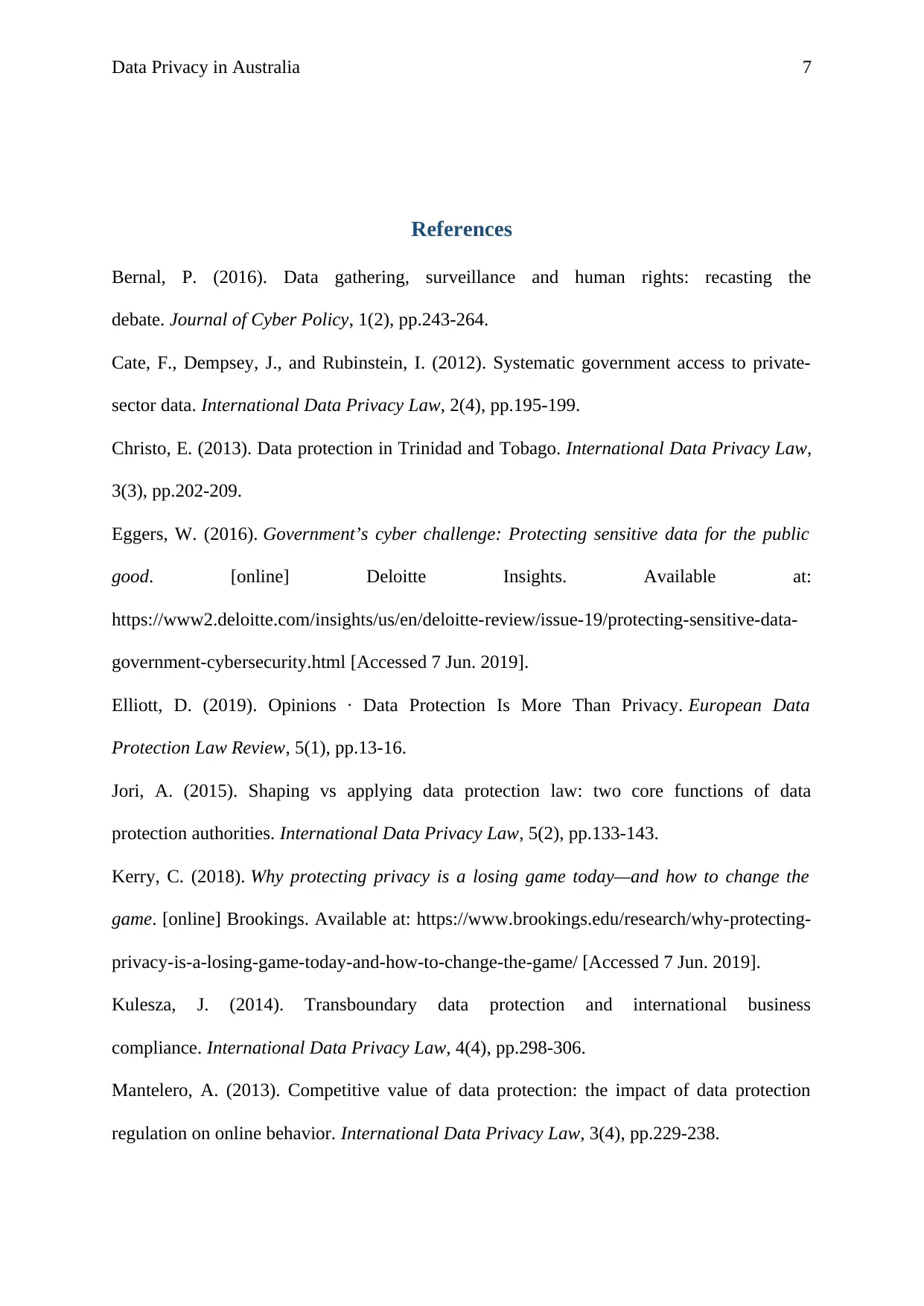
Data Privacy in Australia 7
References
Bernal, P. (2016). Data gathering, surveillance and human rights: recasting the
debate. Journal of Cyber Policy, 1(2), pp.243-264.
Cate, F., Dempsey, J., and Rubinstein, I. (2012). Systematic government access to private-
sector data. International Data Privacy Law, 2(4), pp.195-199.
Christo, E. (2013). Data protection in Trinidad and Tobago. International Data Privacy Law,
3(3), pp.202-209.
Eggers, W. (2016). Government’s cyber challenge: Protecting sensitive data for the public
good. [online] Deloitte Insights. Available at:
https://www2.deloitte.com/insights/us/en/deloitte-review/issue-19/protecting-sensitive-data-
government-cybersecurity.html [Accessed 7 Jun. 2019].
Elliott, D. (2019). Opinions ∙ Data Protection Is More Than Privacy. European Data
Protection Law Review, 5(1), pp.13-16.
Jori, A. (2015). Shaping vs applying data protection law: two core functions of data
protection authorities. International Data Privacy Law, 5(2), pp.133-143.
Kerry, C. (2018). Why protecting privacy is a losing game today—and how to change the
game. [online] Brookings. Available at: https://www.brookings.edu/research/why-protecting-
privacy-is-a-losing-game-today-and-how-to-change-the-game/ [Accessed 7 Jun. 2019].
Kulesza, J. (2014). Transboundary data protection and international business
compliance. International Data Privacy Law, 4(4), pp.298-306.
Mantelero, A. (2013). Competitive value of data protection: the impact of data protection
regulation on online behavior. International Data Privacy Law, 3(4), pp.229-238.
References
Bernal, P. (2016). Data gathering, surveillance and human rights: recasting the
debate. Journal of Cyber Policy, 1(2), pp.243-264.
Cate, F., Dempsey, J., and Rubinstein, I. (2012). Systematic government access to private-
sector data. International Data Privacy Law, 2(4), pp.195-199.
Christo, E. (2013). Data protection in Trinidad and Tobago. International Data Privacy Law,
3(3), pp.202-209.
Eggers, W. (2016). Government’s cyber challenge: Protecting sensitive data for the public
good. [online] Deloitte Insights. Available at:
https://www2.deloitte.com/insights/us/en/deloitte-review/issue-19/protecting-sensitive-data-
government-cybersecurity.html [Accessed 7 Jun. 2019].
Elliott, D. (2019). Opinions ∙ Data Protection Is More Than Privacy. European Data
Protection Law Review, 5(1), pp.13-16.
Jori, A. (2015). Shaping vs applying data protection law: two core functions of data
protection authorities. International Data Privacy Law, 5(2), pp.133-143.
Kerry, C. (2018). Why protecting privacy is a losing game today—and how to change the
game. [online] Brookings. Available at: https://www.brookings.edu/research/why-protecting-
privacy-is-a-losing-game-today-and-how-to-change-the-game/ [Accessed 7 Jun. 2019].
Kulesza, J. (2014). Transboundary data protection and international business
compliance. International Data Privacy Law, 4(4), pp.298-306.
Mantelero, A. (2013). Competitive value of data protection: the impact of data protection
regulation on online behavior. International Data Privacy Law, 3(4), pp.229-238.

Data Privacy in Australia 8
Pollach, I. (2011). Online privacy as a corporate social responsibility: an empirical
study. Business Ethics: A European Review, 20(1), pp.88-102.
Scassa, T. (2014). Privacy and Open Government. Future Internet, 6(2), pp.397-413.
Tene, O. (2010). Privacy: The new generations. International Data Privacy Law, 1(1), pp.15-
27.
Pollach, I. (2011). Online privacy as a corporate social responsibility: an empirical
study. Business Ethics: A European Review, 20(1), pp.88-102.
Scassa, T. (2014). Privacy and Open Government. Future Internet, 6(2), pp.397-413.
Tene, O. (2010). Privacy: The new generations. International Data Privacy Law, 1(1), pp.15-
27.
⊘ This is a preview!⊘
Do you want full access?
Subscribe today to unlock all pages.

Trusted by 1+ million students worldwide
1 out of 9
Related Documents
Your All-in-One AI-Powered Toolkit for Academic Success.
+13062052269
info@desklib.com
Available 24*7 on WhatsApp / Email
![[object Object]](/_next/static/media/star-bottom.7253800d.svg)
Unlock your academic potential
Copyright © 2020–2026 A2Z Services. All Rights Reserved. Developed and managed by ZUCOL.




